We’re reader-supported. When you buy through links on our site, we may earn an affiliate commission.
55% of Americans agree that community is important. 1 The other 45% are cranky like me.
In my Skool review, I’ll help you decide whether this community-centered course software is right for your business.
I built my first online course in the early 2000s. Yeah. I emailed my students stone tablets.
Anyhow, I’ve seen a lot. So, I’ll let you know how Skool stacks up compared to your other options.
If you’re a hands-on person, get the Skool free trial and follow along with my Skool review.
Table of Contents
What Is Skool / What Is Skool.com / What Is Skool Platform?
Skool is a platform for building and monetizing an online community.
Here’s a Skool tutorial showing you the features:
At its heart and liver, Skool is a course builder – allowing you to create online courses that your fans will pay for. But Skool is a whole lot more.
With Skool, you can manage events, host conversations, and boost engagement through gamification. The idea isn’t just to build a passive list of customers. It’s to develop a genuine community around your personal brand.
And that sense of community is key with Skool.
I mean, you don’t want to turn your online business into a cult – but if your goal is to make money, a bit of cult-like enthusiasm never hurts! Skool is a good Learning Management System (LMS) for creating genuine bonds with customers.
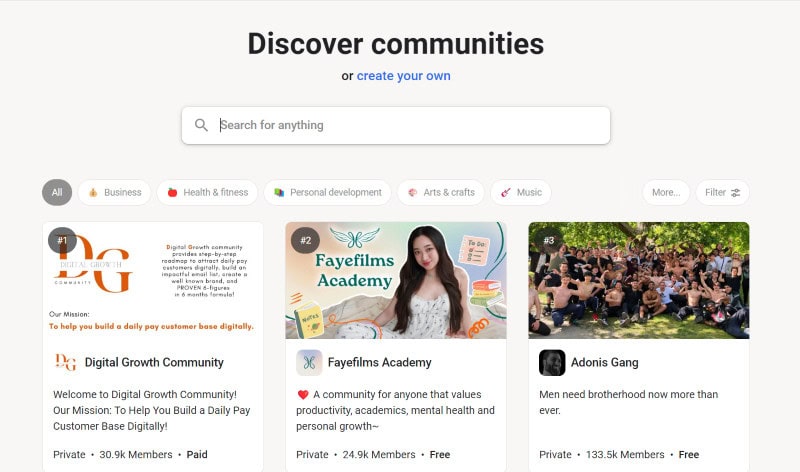
Is Skool Legit?
Skool is definitely legit. Skool was founded in 2019 and is based in Los Angeles.
On some corners of the internet (ahem – Reddit), uninformed people leave Skool reviews claiming that the platform is a pyramid scheme. They see that several creators on Skool base their courses on how to make money on Skool, and so they conclude it’s all a self-contained scam.
But that’s not true. Lots of Skool communities provide genuine value to their members.
Take a quick look at the homepage of Skool’s website. You’ll see communities for:
- Improving mental health
- Using artificial intelligence (AI)
- Smelling better as a man (now there’s a clever niche! I’ve always wanted to stink good.)
Skool isn’t a pyramid scheme if its communities are providing people with valuable information. I mean, c’mon now.
Now, whether Skool is worth it or not is another story. Let’s examine it.
Is Skool Worth It?
Skool is worth it for anyone who wants to build a community around their personal brand.
I have a personal brand. It’s my face smeared with BBQ sauce while chomping chicken wings and talking about business stuff.
Before signing up for Skool, decide what sort of business you’re planning to operate.
Do you want an active community where you regularly hold events and interact with your users? That’s probably a good idea (engaged users tend to be loyal users), and Skool can make it happen.
You can create courses, schedule events, and manage a list of users, all on a single platform. It’s convenient and profitable!
But maybe you’d rather keep a low profile and just sell online courses. Or maybe you have your sights set on passive income, where you keep attracting customers without having to plan events or interact with paying members. In that case, Skool might not be your best option.
You could go with a different course builder like Xperiencify, Thinkific, or Teachable instead.
Skool Pricing / Skool.com Pricing / How Much Does Skool Cost / How Much is Skool?
What would a Skool.com review be without a discussion of pricing? Let’s talk cost.
Skool offers exactly one plan. It costs $99 per month, and it includes:
- 1 group/community
- All the platform’s features
- Unlimited courses
- Unlimited members
- A 2.9% + $0.30 transaction fee
What’s that transaction fee all about? It just means that when a customer buys a course or group subscription through the platform, Skool takes a cut.
The transaction fee is lower than what you get with lots of other course-building platforms. That’s yet another reason my Skool review is so positive!
You can also try out Skool with a 14-day free trial.
If Skool sounds like a lot of money, hot dang, ya gotta believe in yourself! Or look for ways to raise money for your business with my help:
- Best small business loans
- Lenme review (it’s an awesome peer-to-peer lending app)
- Best banks for small business
- Best business credit cards
- eCommerce credit card
- How to flip money fast
- Financial planning for small businesses
- How to get a startup business loan with no money
How Does Skool Work?
It’s time for my Skool review to describe exactly how Skool works. But don’t worry. You’re not about to get bogged down in the details of a complex process. Using Skool is simple!
Your first task is to sign up for Skool. Follow these steps:
- Go to the official Skool website.
- Click “Create your own.”
- Open an account by providing your name/email and creating a password.
From there, you can set up your community and start creating courses in just 30 minutes.
Skool markets itself as an all-in-one platform, and according to many Skool reviews, it lives up to that. You won’t have to integrate with all sorts of outside tools. Skool gives you everything you need to create content, engage users, and (most importantly!) keep the money flowing.
Speaking of money, there are two main ways to monetize your Skool community:
- Subscription memberships
- 1-time course purchases
The money you make will be transferred directly to your bank account every Wednesday. That means Wednesday Wings Day will be fun!
(Not sure Wednesday Wings are a thing, but like Taco Tuesday, it totally should be.)
To consistently grow your community, put on your administrator hat. People won’t flock to a mismanaged personal brand!
Skool gives you the tools you need to manage your group (a.k.a. classroom), including:
- A course builder
- A calendar for scheduling events
- Leaderboards and other gamification features to boost engagement
- The ability to add and remove group members
With all that, you could become the master of a vast digital domain! Vast.
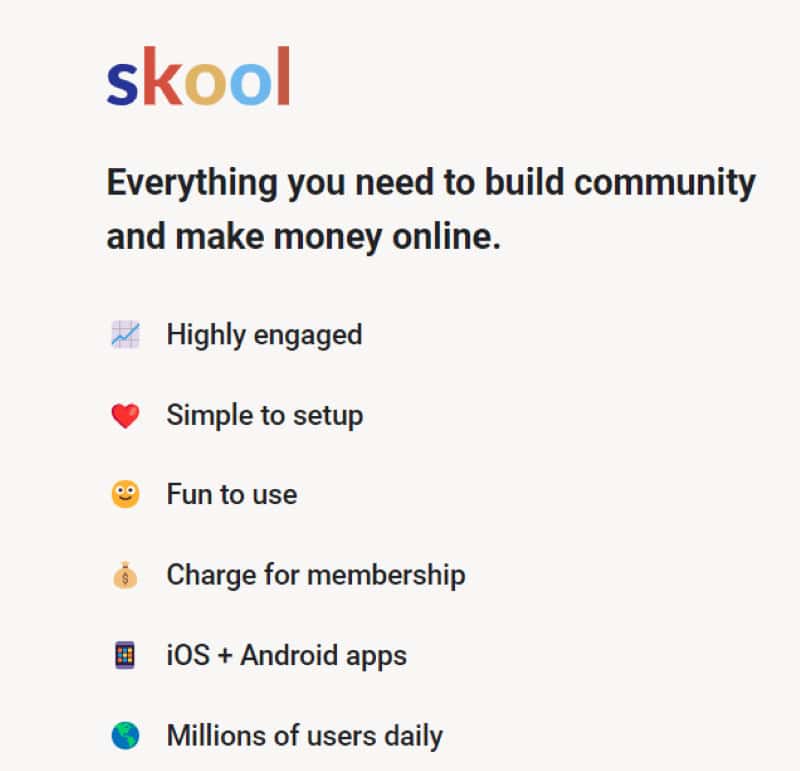
What Is The Catch With Skool?
There really is no catch with Skool. They offer a single plan for $99 a month, and you’ll pay a 2.9% + $0.30 transaction fee whenever someone buys a course or subscription. This information is available right on the company’s website.
I like Skool’s simple pricing structure.
Is Skool Safe?
Skool is completely safe. While researching the platform, I wasn’t able to find any reports of fraudulent behavior, and plenty of Skool.com reviews describe a positive user experience.
To be clear, Skool does collect personal data from users. They say in their privacy policy that they share this data with three different groups:
- Service providers and subcontractors
- Professional advisors
- Third parties in the case of a merger or other corporate transaction
This is pretty normal in the world of digital businesses. I don’t see any red flags, which is why my takeaway for my Skool review is that the platform isn’t risky.
Skool Pros and Cons
Skool is a fantastic platform for most digital entrepreneurs, but there are a few drawbacks to consider. Read my pros and cons before signing up.
Skool Pros:
- There’s an emphasis on engagement. Through gamification, chats, and scheduled events, you can turn mere customers into active participants.
- The transaction fee is low. When someone pays for a course or to be part of your community, Skool only takes 2.9% + $0.30 each time.
- Getting started is easy. You can create a Skool community in just 30 minutes.
Skool Cons:
- There’s no flexibility in the pricing. Skool offers one plan for $99 a month. The simplicity is nice, but users might appreciate a cheaper plan option.
- The course-builder doesn’t offer much customization. Other course-building platforms give you tons of design options. Skool keeps it simpler.
- You’ll have to be an active administrator. A Skool community isn’t a passive income source. The idea is to maintain engagement by planning events and interacting with community members.
If you’re fortunate enough to have a team or virtual assistants to help you, check out my articles: remote employee training and employee training software.
Skool Reviews
To get a better feel of the platform’s user experience, let’s take a look at Skool reviews.
Here’s a Skool review on YouTube that weighs the positives and negatives:
On Quora, someone called Skool “seriously fantastic.” They said Skool is great for coaches, consultants, and online course creators while warning that it’s not ideal for anyone selling physical products.

I also found Skool.com reviews on Reddit. In one thread, users had a fascinating back-and-forth about the merits of the platform.
In a negative Skool review, someone said that the platform felt like a “pyramid scheme” where “everyone’s hustling to get rich.”
But someone else said they’d been using Skool for months and loved it. They especially appreciated that “the vibe is way better” than with alternatives like Facebook groups.
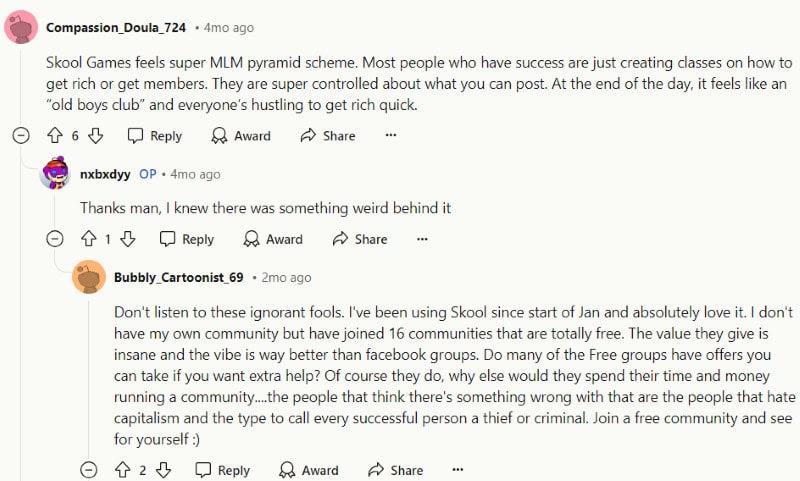
In another Skool.com review on Reddit, someone mentioned that “gamification makes participating fun.”
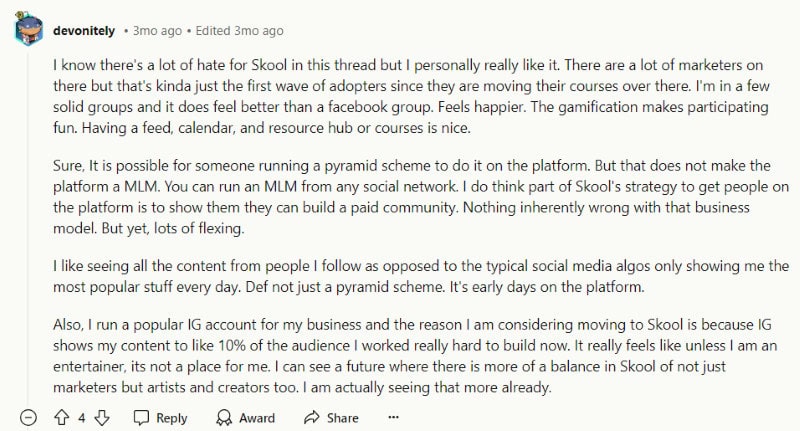
Another Redditor left a positive Skool review praising the platform’s payment system.
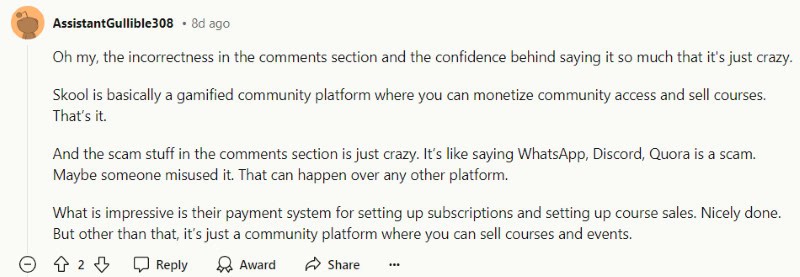
Selling online courses is a sweet way:
- How to make 50k a month
- How to make 30k a month
- How to make 20k a month
- How to make 10k a month
- How to make 20000 dollars a week
- Jobs that pay 1 million dollars a month
- Jobs that pay over 1 million a year
Want a role model that’s proof? Check out Miss Excel. She friggin’ CRUSHES it with her courses.
She gains prospects with fun social media on TikTok and Instagram. She captures leads. Then she sells her quality courses. She’s making millions of dollars. Yeah. Study her.
That’s why teaching courses makes my list of low-cost business ideas with high profit and is one of the most profitable online businesses.
Online education is one of the best business ideas for women and men who enjoy helping people learn new things.
Common Questions About Skool
Skool Alternative / Skool Competitors / Alternatives To Skool / Similar To Skool?
Here are course-building platforms you could use instead of Skool:
- Xperiencify (learn more in my Xperiencify review)
- LearnWorlds (here’s my complete LearnWorlds review)
- Thinkific
- Teachable
- Skillshare
- Podia
- Foundr
- Kajabi
Some of the best email marketing software lets you create an online course within their software.
Many sales funnels have course building as a feature:
- ClickFunnels vs WordPress
- DropFunnels vs ClickFunnels
- Pipeline Pro vs ClickFunnels
- Kajabi vs ClickFunnels
- ClickFunnels vs Website
- Builderall vs ClickFunnels
- SamCart vs ClickFunnels
- Thrive Themes vs ClickFunnels
- Kartra vs ClickFunnels
- ClickFunnels vs Kit
- ClickFunnels vs Shopify
- Sellfy vs Shopify
Skool Features?
Skool has a wide range of helpful features, including:
- Classroom (for courses, videos, and other content)
- Calendar (for scheduling group events)
- Gamification
- Email broadcasts
- Chat
- Pops popcorn
These Skool features make it easy to build and monetize an online community and enjoy snacks.
Is Skool Free?
No, man. If you want free, try to convince people to pay for your bootleg Whatsapp group chat.
Skool isn’t free, but they offer a 14-day free trial. Once the trial is over, you’ll pay $99 per month. There’s also a transaction fee of 2.9% + $0.30, which you’ll pay whenever someone buys a course or membership.
You get what you pay for. Skool is worth it if you’re serious about making money from your online course.
Skool is affordable. Teaching online can be one of your hobbies to make money. Skool is a proven way how to make money online for beginners. The key is to have knowledge to share.
Skool Community Platform?
Skool is a platform for creating an online community. A typical Skool community includes online courses, group events, and gamified elements – which are all designed to boost engagement. You can monetize your community by charging a subscription fee or selling individual courses.
Can I Make Money With Skool?
You can absolutely make money with Skool. Once you’ve created a Skool community (which only takes 30 minutes), you can monetize it by selling individual courses or charging subscription fees. The money in your Skool balance will be paid directly to your bank account each week.
Related:
- How to make more money
- How to get sponsored by brands
- How to make money on Facebook
- How to make money on Pinterest
- How to make money as a video editor
- How to make money as a travel photographer
- How to make money on Audible
- How to make money as an independent artist
- Scribehow review
- RankIQ review
- Business to start with 10k
- How to turn 10k into 100k
- Online business for sale
- Referral bonus apps
- Earn 20 dollars per referral
- How to make money as an attractive female
- Affiliate programs for moms
- How to make money as an attractive male
- Best small business accounting software
- Why do you need an LLC
- LLC Checklist
- LLC 101
- How to avoid using home address for LLC
- Best LLC service
- Bizee vs ZenBusiness
- Solopreneur marketing
- Highest paying travel affiliate programs
- Relationship affiliate programs
- ShopMy vs LTK
- Substack vs Medium
- Kit vs Mailchimp
- Beehiiv vs Substack
- Kit review
- SEO for travel bloggers
- Therapy for business owners
- Best shipping label printer
- How to make money on X
- Online businesses for sale under $5,000
- How to invest 5k in real estate
- Best small business firewall review
- How to make 400 dollars fast
- How to make 600 dollars fast
- How to make 700 dollars fast
- How to make 800 dollars fast
- How to make 900 dollars fast
- How to make 3000 dollars fast
- How to make money fast
- How to double 10k quickly
- What Flips
- Start a pet care blog
- Best website builder
- Best web hosting services
- Best small business website design
- Best blogging platform
- Best managed WordPress hosting
Sources:
1 – https://news.gallup.com/poll/508793/community-hobbies-money-grow-importance-americans.aspx
